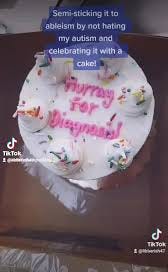I stumbled onto AutisTikTok just weeks before my neuropsych eval, and honestly, it became a lifeline. When I was first diagnosed, it was the first place I went because I knew the people there would celebrate me, rather than bombard me with platitudes about how “autism doesn’t define you.” In that moment, I needed to hear congrats, not explanations about how I should define myself outside of this diagnosis.
AutisTikTok wasn’t just a place for me to process my diagnosis—it was where I began to truly understand autism, particularly things like Pathological Demand Avoidance (PDA) and how accommodations can make a huge difference. It informed my advocacy and activism, helping me see that there is no one-size-fits-all approach to neurodivergence, and that’s something I carry into my work every day.
Being in that space also made me a much stronger clinician. While I definitely brought my mental health expertise to the space, it pushed me to think about advocacy and neurodivergence in ways that were way beyond anything I learned in grad school. The discussions I engaged with shaped my understanding of autistic experiences—from PDA to accommodation needs—and informed my practice in ways that complemented and expanded my formal training. These insights never felt like a conflict; they just enhanced the work I was already doing.
That being said, AutisTikTok has never been a perfect space. It’s been a place of growth, but also one of deep, difficult dynamics. At times, it’s been misogynistic, racist, and riddled with lateral ableism, with people policing one another’s identities and experiences within the neurodivergent community. These challenges haven’t been easy to navigate, and they’ve often made it feel like a really hard space to be in. But despite these struggles, AutisTikTok has evolved, and many of us have grown alongside it. It’s not a static space—it’s been shaped by the voices of marginalized individuals pushing for change and calling out injustices within the community.
The diversity of voices in the space has grown immensely—at first, it felt like the most popular voices were those of white women with low support needs, but now the platform is much more diverse. While those voices still remain disproportionately amplified, the platform has become home to a broader spectrum of autistic perspectives. It’s not perfect, but there’s been real progress.
If it really does disappear by January 19, I’ll feel a sense of loss. It’s been a place where I’ve found community, support, and even moments of joy in unexpected ways. But I also know that if it goes away, I’ll carry the growth it fostered in me into the next chapters of my life, having learned to both celebrate and critique the space I inhabited. It’s been a good run, but a complicated one, and I’ve been lucky to be a part of it.
So, if it’s the end of AutisTikTok, I’ll be sad, but I’ll also be grateful for the space it’s given me to learn, connect, and grow. And I’ll take that evolution forward, continuing to work for a world that values all neurodivergent experiences.



Just catching this now, but I agree and relate to so much of what you're written here. Especially with issues of lateral ableism.